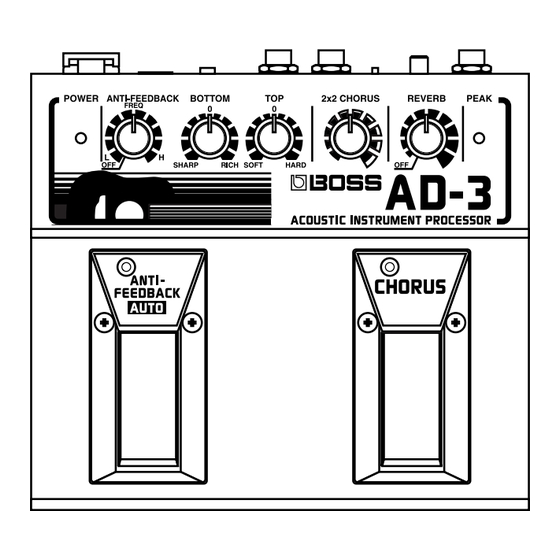Table of Contents
Advertisement
Advertisement
Table of Contents

Summary of Contents for Boss AD-3
- Page 1 OWNER’S MANUAL...
-
Page 2: Using The Unit Safely
• Do not attempt to repair the unit, or replace parts within it (except when this manual provides specif- ic instructions directing you to do so). Refer all ser- vicing to your retailer, the nearest Roland Service Center, or an authorized Roland distributor, as list- ed on the “Information” leaflet. - Page 3 • Immediately turn the power off, remove the AC adaptor from the outlet, and request servicing by your retailer, the nearest Roland Service Center, or an authorized Roland distributor, as listed on the “Information” leaflet when: • The AC adaptor or the power-supply cord has been damaged;...
-
Page 4: Table Of Contents
Contents USING THE UNIT SAFELY ...2 IMPORTANT NOTES ...5 Introduction ...6 Main Features ...6 Panel Descriptions...7 The Power Supply ...8 Loading the Batteries...8 Using an AC Adaptor...8 Getting Ready to Play ...9 Connections...9 Turning the Power On...10 Turning the Power Off ...10 Making the Settings ...11 Adjusting the Input Level...11 Adding Breadth to the Sounds (2 x 2 Chorus)...11... -
Page 5: Important Notes
IMPORTANT NOTES In addition to the items listed under “USING THE UNIT SAFELY” on page 2, please read and observe the following: Power Supply: Use of Batteries • Do not use this unit on the same power circuit with any device that will generate line noise (such as an electric motor or variable lighting system). -
Page 6: Introduction
Introduction Thank you, and congratulations on your choice of the BOSS AD-3 Acoustic Instrument Processor. ●●●●●●●●●●●●●●●●●●●●●●●●●●●●●●●●●●●●●●●●●●●●●●●●●●●●●●●●●●●●●●●●●●●●●●●●●●●●●●●●●●●●●●●●●●●●●●●●●●●●●●●●●●●●●●●●●●●●●●●●●●●●●●●●●●●●●●●●●●●●●●●●●●●●●●●●●●●●●●●●●●●●●●●●●●●●●●●●●●● Before using this unit, carefully read the sections entitled: “USING THE UNIT SAFELY” and “IMPORTANT NOTES” (p. 2; p. 5). These sections provide important information concerning the proper operation of the unit. -
Page 7: Panel Descriptions
Panel Descriptions fig.1 ANTI-FEEDBACK Knob POWER Indicator Pedal Indicator ANTI-FEEDBACK AUTO Pedal INPUT LEVEL Knob INPUT Jack BOTTOM Knob 2 x 2 CHORUS Knob TOP Knob REVERB Knob CHORUS Pedal OUTPUT SELECT Switch OUTPUT Jack L, R AC Adaptor Jack POWER Switch PEAK Indicator... -
Page 8: The Power Supply
Make sure the “+” and “-” ends of the batteries are oriented correctly. fig.Batt Using an AC Adaptor The BOSS PSA Series AC adaptor (sold separately) can be used to run the AD-3 from a household elec- trical outlet. fig.PSA AC Adaptor (PSA-Series; sold separately) -
Page 9: Getting Ready To Play
Getting Ready to Play Connections Connect your guitar and amp to the AD-3 as shown below. fig.2 Electric Acoustic Guitar Guitar Amplifier If you’re using a guitar amp, connect the OUTPUT R jack to the guitar amp and set the OUTPUT SELECT switch to G.AMP. -
Page 10: Turning The Power On
A brief interval (a few seconds) after power-up is required before the unit will operate normally. The peak indicator blinks for a few seconds, then you can use the AD-3 for playing. When running off batteries, the AD-3 won’t NOTE switch on unless there’s something plugged... -
Page 11: Making The Settings
Chorus can be applied simultaneously to both bass and treble ranges in both left and right channels. You use the Chorus pedal on the AD-3 to toggle the chorus effects on and off. 1. Press the Chorus pedal. -
Page 12: Adding Reverberations To The Sounds (Reverb)
(such as a room or hall), the composition of the surface (a wall, for example) reflecting the sound, and so on. With the AD-3, these elements are digitally simu- lated to obtain the optimal reverb for the acoustic guitar. -
Page 13: Adjusting The Bass Sound (Bottom)
Adjusting the Bass Sound (Bottom) This knob adjusts the sound of the guitar’s sound box, or suppresses excess bass notes. 1. Adjust the Bottom knob. fig.10 Setting this more toward RICH accents the rich- ness of the sound-box reverberations, and setting it more toward SHARP suppresses the bands that interfere with vocals and the like, thus helping to prevent acoustic feedback (howling). -
Page 14: Reducing Acoustic Feedback (Anti-Feedback)
This features attenuates the sounds at the frequen- cy where acoustic feedback occurs, thus suppress- ing the acoustic feedback. The AD-3 has two types of built-in anti-feedback features. One sets the howling point with a control knob. The other automatically detects the howling point when you press the pedal. -
Page 15: Switching On The Anti-Feedback Auto Function
Switching On the Anti-feed- back Auto Function 1. Press the Anti-feedback Auto pedal. fig.14 The pedal indicator blinks while detection of the howling point is in progress, and lights up steadi- ly when detection ends. Switching off the power returns the pedal to NOTE its off state. -
Page 16: Appendices
Appendices Troubleshooting If there is no sound, or if you think that the AD-3 may be malfunctioning, please first go through the follow- ing checkpoints. If after these checkpoints the prob- lem is still unresolved, consult your nearest Roland service center or authorized Roland distributor. -
Page 17: Setting Samples
Setting Samples Flat Back Fusion fig.16a Unplugged Rock fig.17a 70’s Folk fig.18a Blues fig.19a Round Back Fusion fig.16b Unplugged Rock fig.17b 70’s Folk fig.18b Blues fig.19b... -
Page 18: Blank Chart
Blank Chart fig.20 fig.20 fig.20 fig.20... -
Page 19: Specifications
Specifications AD-3: ACOUSTIC INSTRUMENT PROCESSOR AD Conversion 20 bit Δ∑ Method DA Conversion 20 bit Δ∑ Method Sample Rate 44.1 kHz Nominal Input Level -10 dBm Input Impedance 4.7 MΩ Nominal Output Level OUTPUT: -10 dBm OUTPUT (balanced): -10 dBm into 600 Ω... - Page 20 G6017439...












Need help?
Do you have a question about the AD-3 and is the answer not in the manual?
Questions and answers